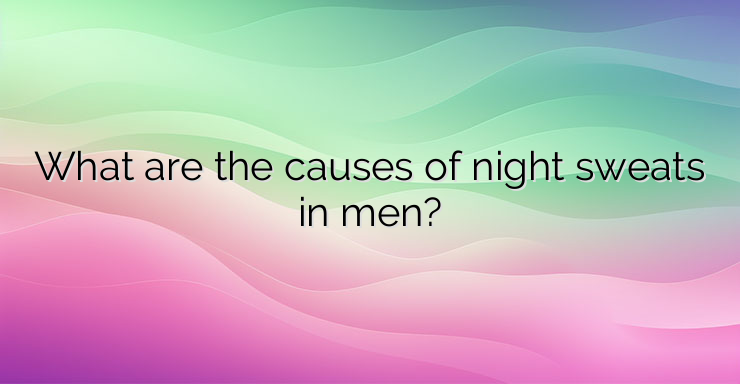Sometimes a person may wake up after sweating profusely, especially when sleeping under too many blankets or if the room is too warm. Although unpleasant, these moments are not usually labeled as night sweats and are usually not a sign of a medical problem. Night sweats in men can occur for non-medical reasons, such as exercising, taking a hot shower, or drinking a hot drink before bed. Night sweats are a problem in men when there are repeated episodes of profuse sweating that soaks clothes and is associated with an underlying medical condition or disease. In general, night sweats are also associated with fever, weight loss, localized pain, cough, diarrhea, or other symptoms of anxiety. Night sweats in men can be related to some common causes. Anxiety or stress Increased sweating often occurs with anxiety or stress. Sweating can occur more often during the day, in the presence of stressful factors, but it can also occur at night. Other signs of increased anxiety or high stress include: Constant worry, fear and tension; Trouble focusing on things other than the source of the stress or worry; An inexplicable feeling of fear; Difficulty falling asleep and sleep disturbance; Weakened immune system; Nightmares; Pains; Stomach problems; Rapid breathing and rapid heart rate; Increased irritability; Weakness or exhaustion; Dizziness and Trembling If left untreated, stress and anxiety can have a major impact on a man’s daily life. Talking to a professional can often help address the source of anxiety and improve symptoms. Gastroesophageal reflux disease (GERD) Night sweats may be associated with gastroesophageal reflux disease (GERD), which occurs when the muscle that normally keeps the esophagus closed does not function properly. When this muscle doesn’t contract properly, acid from the stomach can pass into the esophagus and cause the burning sensation. If this condition occurs more than once a week, it may be an indication of the presence of GERD. GERD can occur both during the day and at night. Symptoms include: Heartburn; Chest pain; Problems with swallowing; Involuntary return of stomach contents back to the oral cavity (regurgitation); Cough, asthma symptoms, or other breathing problems (usually with acid reflux at night); Sleep problems If night sweats frequently interrupt sleep and heartburn relief medication is needed at least once or twice a week, then a doctor should be seen. Hyperhidrosis Sweating occurs as a normal response to increased temperature, activity, and nervousness or fear. But sometimes the nerves that activate the sweat glands send signals to them when the body doesn’t feel the need to sweat.Specialists do not always establish the reasons why this happens. The condition can cause profuse sweating of the entire body or just one or two specific areas of the body. This disorder is called hyperhidrosis. Idiopathic hyperhidrosis is excessive sweating that occurs without a clear medical reason. Secondary hyperhidrosis has an underlying cause, such as a medical condition, or it can be triggered by medication. With hyperhidrosis, you can observe: Sweating with stains on clothes; Sweating during the day, although it can also occur at night; Sweating of the feet, palms, face or armpits; Sweating in one or more areas; Bilateral sweating Bibliography: National Health Service. Night sweats Haider A, et al. Focal hyperhidrosis: Diagnosis and management Young P. Gastroesophageal reflux as a cause of night sweating


Leave a Reply